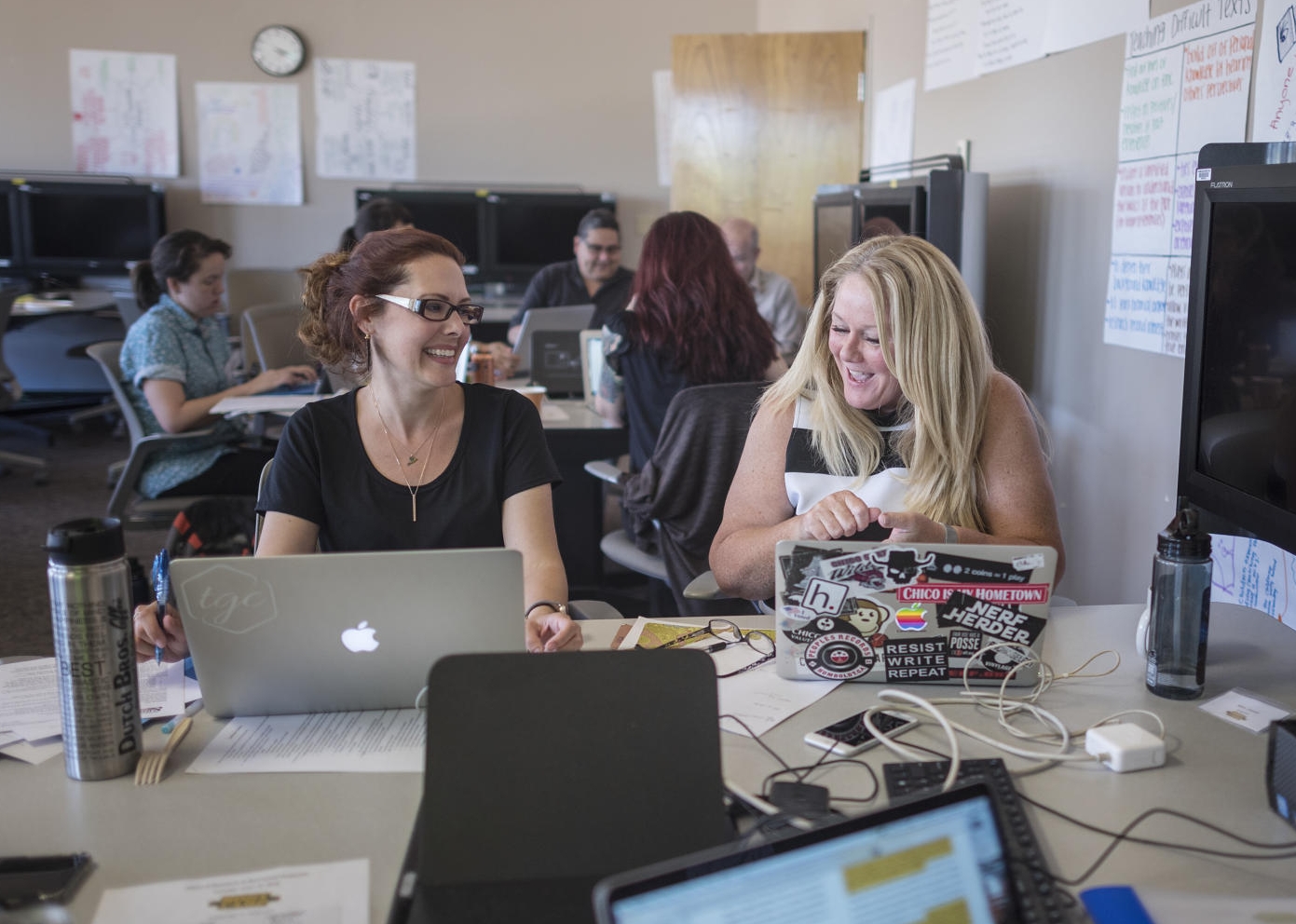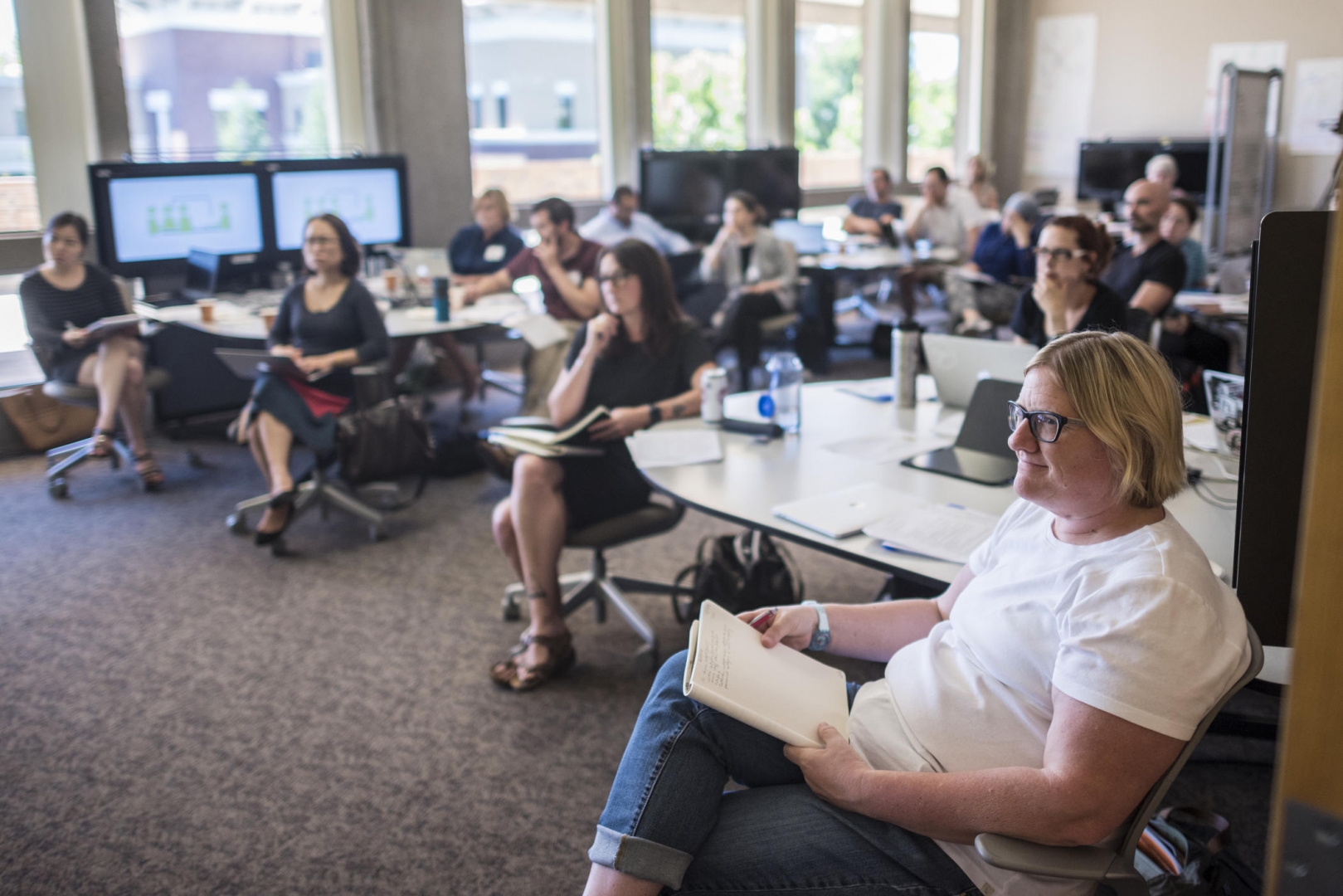Faculty Boost Grant Skills at Boot Camp

Faculty Janell Bauer (left) and Kim Jaxon (right) participant in a writing activity as the Office of Research and Sponsored Programs holds a grant-writing bootcamp on Tuesday, June 12, 2018 in Chico, Calif. Participants have been identified as campus leaders with great potential for securing funding for research. (Jason Halley/University Photographer/CSU Chico)
Kim Jaxon has a multitude of visions for research that supports her Northern California Writing Project.
Whether helping Siskiyou County high school students use writing to think about civic engagement, or teaching argumentative writing in 4th–12th grade rural classrooms, or providing support for beginning teachers struggling with isolation from their colleagues, the English professor sees benefits in it all.
“The big picture for us is always helping teachers become leaders in their field and keeping them teaching,” she said. “And we want to broaden the definition of what counts as writing and literacy and make sure it’s in schools.”
But to do that—and track her effectiveness—Jaxon needs money. With help from Chico State’s Office of Research and Sponsored Programs (RESP), she secured it—receiving $250,000 across four grants in the last year.
“I can’t imagine now not having a grant,” she said. “It’s like, where can I get the next one?”
A year ago, Jaxon had never written a grant entirely on her own. In summer 2018, she was one of 18 faculty invited to attend RESP’s inaugural Grant Writing Boot Camp, which enhances research capacity and opportunity at Chico State by strengthening faculty grant writing strategies and practices.
With support, professors can create better narratives and project designs, learn about the funder review process, and identify collaborators and subconsultants, said Julie Jessen, RESP senior grant development specialist. The workshop also teaches how to fit grant writing into your workload, find research mentors, and involve students in research.
Now an annual offering, the boot camp finished up last week with another round of 20 faculty who are enthusiastic and ambitious to secure funding and create cross-disciplinary partnerships to make their research a reality.
“In California, there is a strong recommendation that if you want more money, you have to go out and get it yourself,” Jessen said. “The people who do this do it really well but we want more people to do it.”

RESP helps submit proposals for about 400 grants and contracts each year, 120 of which are competitive and have the potential of securing anywhere from $10,000 to $5 million.
“This is just the beginning of things we will be doing to increase our research profile, and we need to be supporting the people who are doing that research,” Jessen said. “It just takes practice.”
RESP boot camp participants are primarily new faculty identified as potential campus leaders by their deans and department chairs. A leading goal is to create mentors across campus who can support one another, establish research collaborators, and submit grant proposals together.
Grant proposals are like a job application: be succinct, make your point early, and put your best foot forward. It also takes a certain personality to be denied for a grant and use the rejection to improve the next attempt, Jessen said.
“One thing I always tell faculty is ‘Someone has to win this award,’” she said.
While Jaxon was disappointed to be denied this week for another grant, she’s eager to take what she learned in the boot camp, review the feedback of why her proposal was not funded, and resubmit it again with the necessary improvements.
“It does make you feel capable,” she said. “People have to think about grants as they do getting published. You have to throw things out there and hope it will stick.”
A self-described “latecomer to academia,” having taught science at the secondary education level for most of her career, science education faculty Anne Stephens had secured a number of grants but never anything like those from the National Science Foundation (NSF), which are typically quite involved. When she and a math professor wanted NSF funding for a project advancing informal STEM learning, the RESP boot camp was just what she needed.
“The team that put this on was incredible. They were super supportive, they checked in on you, and the bonds you make with other faculty provide support well beyond the four days of the institute,” Stephens said. “That’s where those relationships get formed and you can do some really neat interdisciplinary projects together.”
The experience was eye-opening, agreed biological sciences faculty Cawa Tran, who had been contributing to grant proposals for much of her academic career but wanted to enhance her success.
“Writing and applying for grants is a big part of what I do,” Tran said, noting the funds are used for running her lab with graduate and undergraduate students as well as maintaining its infrastructure and buying equipment.
With challenges including the Camp Fire and the 35-day federal government shutdown, she has not yet submitted her NSF grant proposal. Rather, she’s been focused on a series of seed grants ranging from $6,000–$20,000, with two funded so far.
Instead of being put off by the competitiveness of an NSF grant, Tran is using those smaller grants as a tool to put together preliminary data so that she can be confident about her final large proposal, using the skills she learned at the boot camp along the way.
“In being a new faculty member—I had just finished my second year—there was very little I knew about RESP in general at that point,” Tran said. “It opened my eyes up to what they do, how they deal with our grants, and more about the Research Foundation.”

While Stephens and her colleague also did not end up submitting their planned proposal, her time at the boot camp paved the way for a funded contract with the Butte County Office of Education to provide expanded learning for teachers in the wake of the Camp Fire. She is also waiting to hear back on a proposal through the North Valley Community Foundation that would provide outdoor education youth services after the Camp Fire.
“Because we already had a proposal, we were ready to rock and roll when this opportunity came into our awareness,” Stephens said.
Jaxon, Stephens, and Tran all agree the most helpful part of the boot camp were presentations by the University’s top grant-securing faculty like David Stachura, Stephanie Bianco, and Kasey DeAtley.
“I think one of the side effects I gained the most from this—and it’s true of any professional development that I’ve done—is meeting other colleagues and learning how our work dovetails and how we can support one another in really impactful ways,” Stephens said. “It’s helped me form partnerships in other grants.”
She connected with a faculty member in political science for a potential project, and has been working with engineering faculty to connect with K-12 educators to support the pipeline of STEM students.
Jaxon agreed, noting her group met weekly throughout the fall. One faculty member continues to email the group weekly for accountability and support. And while she was the only faculty representing the humanities in her boot camp, this year there were three, and she envisions a growing network of colleagues who can support one another.
For faculty who did not attend the boot camp, Jaxon encourages them to visit RESP at its Main Street office or consider attending next year.
“They know way more than we can ever know and will help you through every part of it,” she said. “We are not alone.”


